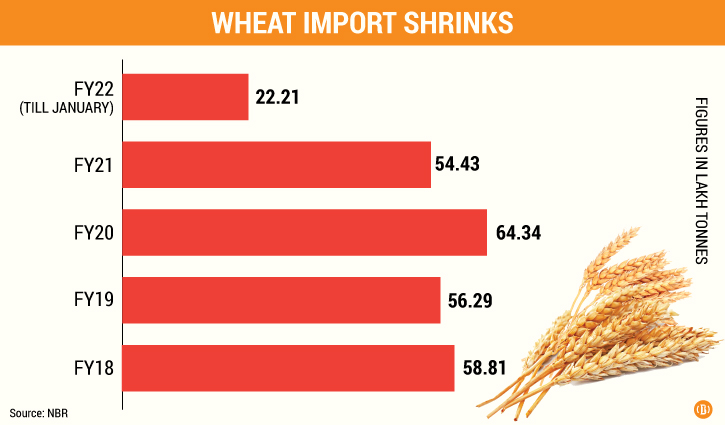Wheat imports dip 35% in 7 months
BI Report || BusinessInsider

Photo illustration: Business Insider Bangladesh
Wheat import has declined 35 percent in the first seven months of the incumbent fiscal year compared to the corresponding period of the earlier fiscal (2020-21) mainly for increased fuel prices, freight charges and fall in local demand due to the Covid-19.
In 2021-22 (until January) around 22.21 lakh tonnes of wheat was imported while in 2020-21, the quantity was 33.91 lakh tonnes, respectively.
According to the National Board of Revenue (NBR) in 2017-18 FY 58.81 lakh tonnes wheat was imported, in 2018-19 FY 56.29 lakh tonnes, 2019-20 FY 64.34 lakh tonnes, 2020-21 FY 54.43 lakh tonnes and 2021-22 FY (till January) 22.21 lakh tonnes, respectively.
Being an essential commodity, wheat bears no import tariff. The annual demand for this grain stands around 77 lakh tonnes and almost 85 percent of which is met through imports, according to NBR and Department of Agriculture Extension (DAE) statistics.
The Food Ministry says the total food storage for 2021-22 FY (until 15 February) was 19.96 lakh tonnes of which 17.15 lakh tonnes are rice, 2.49 lakh tonnes are wheat and 0.48 lakh tonnes are paddy, respectively.
Importers explain that among all developing countries like Bangladesh where fast food is getting popular, wheat demands have been rising sharp.
Wheat is the second largest consumed grain after rice in Bangladesh and having enough food nutrition, health-conscious people along with the younger people prefer ‘Ruti’, (made by Ata or flour) over rice, said Abul Bashar, chairman of BSM Group.
The enormous freight charge since the pandemic broke and increasing fuel price in the international market are the reasons for the drop in wheat imports, he added.
Bashar, who is one of the country’s top wheat importers, said that despite Bangladesh’s ranking as the world’s fifth largest wheat importer after Egypt, Indonesia, Algeria, and Brazil in 2020-21, its imports have hit a new low in the current fiscal year.
“We imported slowly due to price hikes in the international markets. Also, our country’s demand suddenly decreased due to the ongoing pandemic,” Bashar explained.
Meanwhile, wheat is shipped primarily from 16 countries, including Russia, Canada, Ukraine, India, the US, Cyprus, Italy, Australia, Argentina, Estonia and Belgium.
The prices of all kinds of wheat products such as coarse flour and fine flour have been increasing gradually. The price of one kg ‘Ata’ or ‘Maida’ is Tk 45 to Tk 55, respectively.
The popularity of whole grains has also grown at present due to a growing health awareness and an increase in diabetes and obesity across the country. The higher protein content and low water content of wheat makes it the superior grain compared to rice, nutritionists say.
In urban areas, almost all like to take ‘Ruti’ and ‘Parata’ for breakfast and those who are diagnosed with high cholesterol and diabetic are prescribed to take ruti at dinner, said Mahfuza Afroz Shathi, Chief Dietician and Nutritionist of Imperial Hospital Ltd.
Having more fiber in wheat compared to rice, who are health conscious also include Ruti instead of Rice on their diet, she added.
























